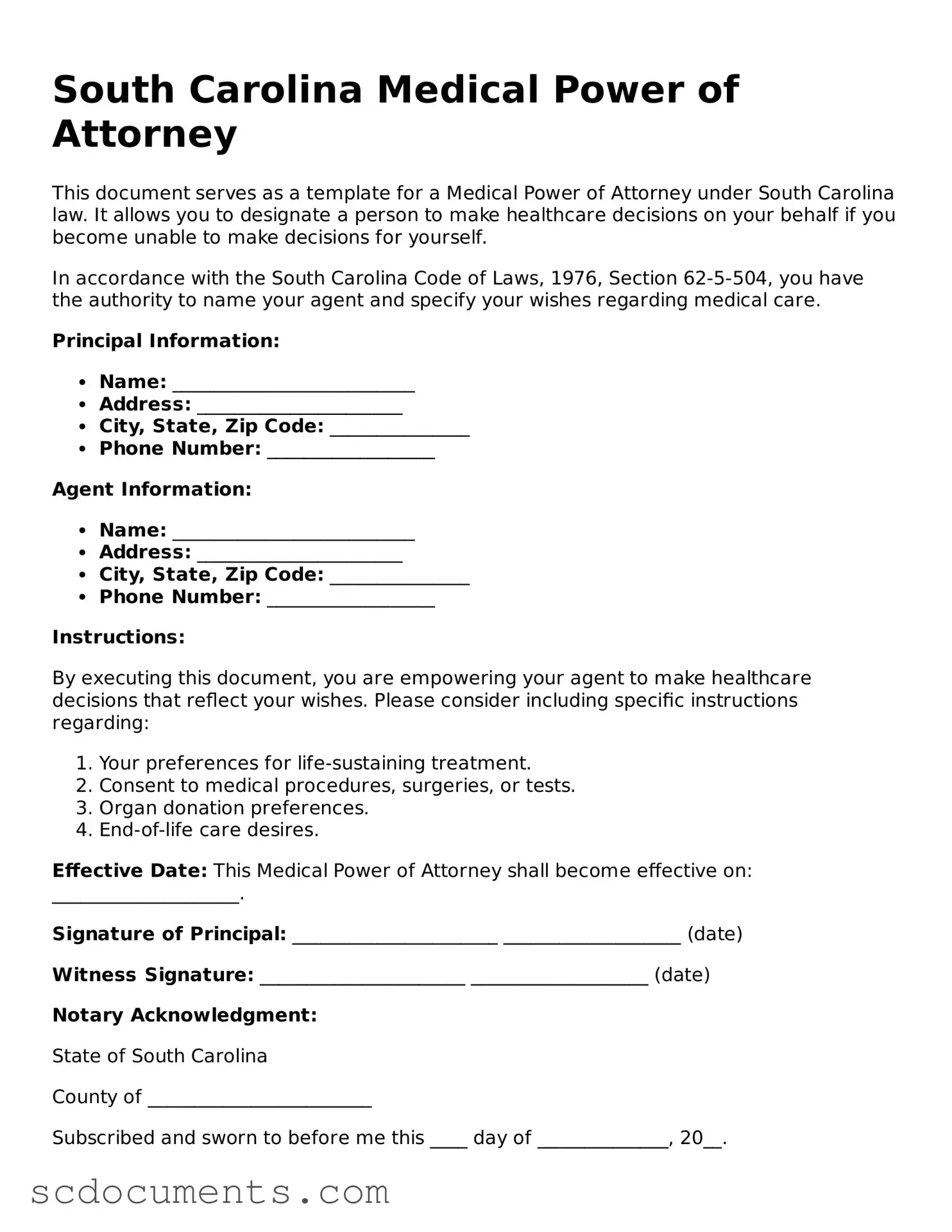Legal South Carolina Medical Power of Attorney Form
Dos and Don'ts
When filling out the South Carolina Medical Power of Attorney form, it is important to follow certain guidelines to ensure the document is valid and effective. Below is a list of things to do and things to avoid.
- Do clearly identify the person you are appointing as your agent.
- Do ensure that the form is signed in the presence of a notary public.
- Do provide specific instructions about your medical preferences, if desired.
- Do discuss your wishes with your agent before completing the form.
- Don't use outdated forms; always use the most current version.
- Don't leave any sections blank; complete all required fields.
File Data
| Fact Name | Description |
|---|---|
| Definition | The South Carolina Medical Power of Attorney form allows individuals to designate someone to make medical decisions on their behalf if they become incapacitated. |
| Governing Law | This form is governed by the South Carolina Code of Laws, Title 62, Chapter 5. |
| Eligibility | Any competent adult can create a Medical Power of Attorney in South Carolina. |
| Signature Requirements | The form must be signed by the principal and witnessed by two individuals or notarized to be valid. |
| Revocation | Individuals can revoke the Medical Power of Attorney at any time, as long as they are competent. |
| Limitations | The designated agent cannot make decisions about mental health treatment unless specifically authorized in the document. |
Documents used along the form
When establishing a Medical Power of Attorney in South Carolina, several other forms and documents can complement this decision. These documents help clarify your healthcare preferences and ensure your wishes are respected in various situations. Here is a list of commonly used forms that may accompany a Medical Power of Attorney.
- Advance Directive: This document outlines your wishes regarding medical treatment in situations where you are unable to communicate. It often includes preferences about life-sustaining treatments.
- Living Will: A specific type of advance directive, a living will details your preferences for medical care in end-of-life situations. It addresses issues like resuscitation and artificial nutrition.
- Durable Power of Attorney: This form designates someone to make financial decisions on your behalf if you become incapacitated. It operates independently of your medical decisions.
- HIPAA Release Form: This document allows designated individuals to access your medical records and information. It ensures that your healthcare agents can make informed decisions based on your medical history.
- Do Not Resuscitate (DNR) Order: This order instructs medical personnel not to perform CPR if your heart stops or if you stop breathing. It is crucial for individuals with specific end-of-life wishes.
- Organ Donation Consent Form: This document expresses your wishes regarding organ donation after death. It can be included in your medical records to ensure your intentions are clear.
- Healthcare Proxy Form: Similar to a Medical Power of Attorney, this form allows you to appoint someone to make healthcare decisions on your behalf if you cannot do so.
- Patient Advocate Form: This document designates a person to advocate for your medical needs and preferences, ensuring that your voice is heard in healthcare settings.
- Missouri 5177 Form: This essential document allows for the correction or completion of information on a vehicle title or certificate of ownership. If you need to correct any information on your vehicle's title, click the button below to easily fill out the Missouri 5177 form: All Missouri Forms.
- Medication Administration Record (MAR): This form tracks medications administered to you in a healthcare setting. It is vital for ensuring proper medication management and adherence.
- Medical History Form: This document provides healthcare providers with essential information about your past medical conditions, treatments, and medications, aiding in informed decision-making.
Each of these documents plays a crucial role in ensuring that your healthcare preferences are honored and that your chosen representatives can act effectively on your behalf. By preparing these forms, you can take proactive steps to secure your medical decisions and provide peace of mind for yourself and your loved ones.
Key takeaways
Filling out and using the South Carolina Medical Power of Attorney form is an important step in ensuring your healthcare wishes are respected. Here are some key takeaways to keep in mind:
- The form allows you to designate someone to make medical decisions on your behalf if you become unable to do so.
- Choose a trusted individual as your agent. This person should understand your values and wishes regarding medical treatment.
- It’s essential to discuss your wishes with your chosen agent before completing the form. Open communication can prevent confusion later.
- Make sure to sign the document in the presence of a notary public or two witnesses. This step is crucial for the form to be legally valid.
- Keep copies of the completed form in accessible places, such as with your healthcare provider, your agent, and your own records.
- Review and update the document regularly, especially after significant life changes, such as marriage, divorce, or a change in health status.
- Understand that the Medical Power of Attorney only becomes effective when you are unable to make decisions for yourself.
- Consider discussing your medical preferences with your healthcare providers to ensure they are aware of your wishes.
Other South Carolina Templates
Scdmv Bill of Sale - Includes sections for both parties to fill out their details clearly.
To effectively create a Last Will and Testament, individuals can refer to various resources that provide guidance and templates. For those looking for readily available documents, the website freebusinessforms.org/ offers helpful forms that can aid in ensuring all necessary details are covered in this vital legal document, reducing the likelihood of later complications among beneficiaries.
General Power of Attorney Form South Carolina - Can be a crucial part of comprehensive estate planning.
